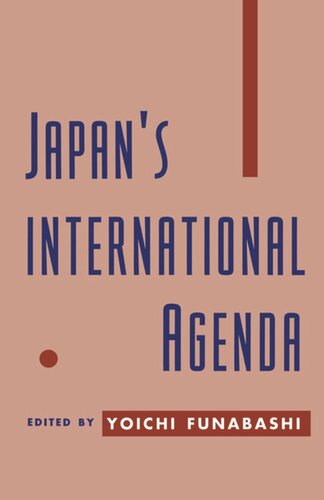

Most ebook files are in PDF format, so you can easily read them using various software such as Foxit Reader or directly on the Google Chrome browser.
Some ebook files are released by publishers in other formats such as .awz, .mobi, .epub, .fb2, etc. You may need to install specific software to read these formats on mobile/PC, such as Calibre.
Please read the tutorial at this link: https://ebookbell.com/faq
We offer FREE conversion to the popular formats you request; however, this may take some time. Therefore, right after payment, please email us, and we will try to provide the service as quickly as possible.
For some exceptional file formats or broken links (if any), please refrain from opening any disputes. Instead, email us first, and we will try to assist within a maximum of 6 hours.
EbookBell Team

4.8
84 reviewsWhat is Japan's political role in the world? Over the past decade, Japan has been increasingly pressured to assume more financial and political burdens globally. Its foreign policy has thus evolved in a piecemeal manner, around the question of managing foreign pressures. To date, policy has been largely developed by bureaucrats, who are traditionally responsible for public policy in Japan. The lack of a clear set of foreign policy objectives, however, has made it impossible for the bureaucracy to play its previous role as the arbiter of public interests.
Today, there is increased recognition that in a more pluralistic society, nongovernmental public policy specialists are needed to provide a more integrated and longer-term vision of foreign policy goals. This book represents the first private and non- governmental indigenous effort to stimulate public debate of Japanese foreign policy.
Japan's International Agenda makes a distinctive contribution to the foreign policy debate. Its contributors are younger Japanese non-governmental foreign affairs specialists, each with considerable international experience and committed to the belief that significant policy reforms are essential. As a statement of Japan's ability to contribute substantially to international policy debates on such broad questions of security and trade and development, Japan's International Agenda will enable scholars and experts in North America, Europe, the Asia-Pacific region, and elsewhere to engage in substantive dialogue on critical public policy issues with their Japanese counterparts. This book represents the first private, indigenous effort to stimulate public debate of Japanese foreign policy. Its contributors are young Japanese foreign affairs specialists, each with considerable international experience and a commitment to the belief that significant policy reforms are essential.